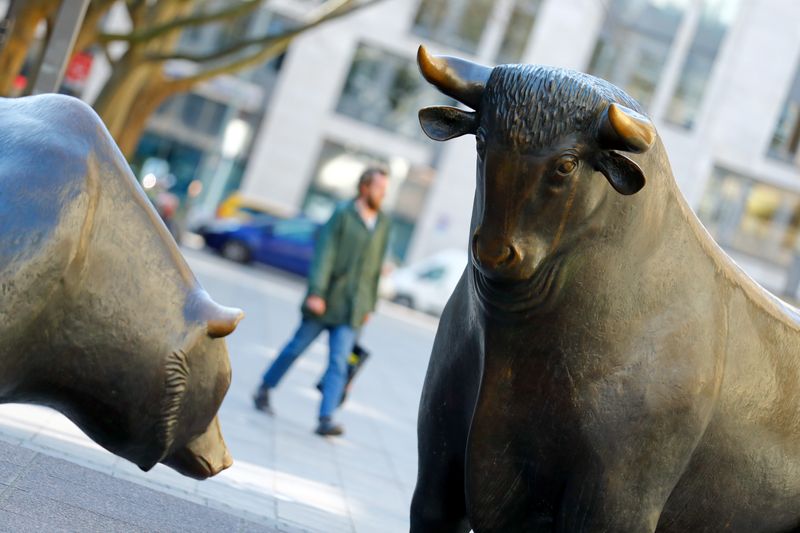This post was originally published on this site
https://i-invdn-com.akamaized.net/trkd-images/LYNXMPEG7P0OG_L.jpg
LONDON (Reuters) – European stocks are expected to stall for the rest of 2020 and miss out on the bull market which has propelled Wall Street to record highs, a Reuters poll of 27 fund managers, strategists and brokers published on Wednesday showed.
Taken over the past two weeks, the survey showed the STOXX 600 (STOXX) would reach only 375 points by the end of 2020, roughly the level the pan-European index closed at on Tuesday.
That would translate to a yearly loss of about 10% and expose the failure of European stocks to completely rebound after the coronavirus-driven March market crash knocked them 38% from their February highs.
By comparison, the S&P 500 (SPX) in New York is up more than 6% on the year, cruising into uncharted new highs on the back of a stellar performance by tech stocks such as Apple (O:AAPL) as well as trillions of dollars’ worth of fiscal and monetary stimulus.
That U.S. outperformance has taken many investors by surprise.
Betting on euro zone shares outperforming was a consensus call about a month ago when EU leaders announced a 750 billion euro ($886 billion) recovery fund after four days and nights of acrimonious negotiations.
Then, European countries were believed to be handling the pandemic and the reopening of their economies better, and political risk was seen shifting from Brussels to Washington amid a wave of unrest and the upcoming U.S. presidential election in November.
The economic narrative has however quickly changed, with the latest data published on Friday showing Europe’s economic recovery losing momentum while activity seems to be steadily picking up on the other side of the Atlantic.
Progress for Europe’s bourses is also expected to be limited in 2021 with an average expectation for the STOXX 600 to reach 410 points by the end of next year, still well below the record 433.9 set on Feb. 19.
On March 16, less than a month after hitting its peak, the index collapsed to 268.57, with airlines, hotels, banks and energy companies among the worst hit.
FALLING PROFITS
A rebound fuelled by unprecedented global monetary and fiscal stimulus – coupled with hopes for a vaccine and economies swiftly reopening – lost steam at the beginning of June and has since stalled amid falling corporate profits.
“We think stock markets will stay in a kind of trading range of around 10%, supported by low (bond) yields on the one hand, and on the other, capped by many risks: economic weakness, geopolitics and the presidential election in the U.S.”, said Jean-Marie Mercadal, deputy chief executive officer at OFI Asset Management.
Mercadal said much of the expected rebound in corporate profits had already been priced in.
So far in the second-quarter earnings season, companies in the STOXX 600 have posted a 57.7% year-on-year fall in profits, the latest I/B/E/S data from Refinitiv shows.
Earnings are expected to decline by 37.8% and 20.5% for the last two quarters of the year, before bouncing back by 41.7% and 65.3% in the first two quarters of 2021.
Major indexes around Europe are expected to follow the trend of the pan-European STOXX 600 and only gradually recover from the March 2020 market crash.
France’s CAC 40 (FCHI) is seen reaching 5,645 points by the end of 2021 after it surpassed 6,100 in February.
London’s FTSE 100 (FTSE) is also not expected to reclaim its 2020 high of 7,689.67 points before the end of the 2021, where it is seen at 6,752.
There’s more optimism for Germany’s trade-sensitive DAX (GDAXI), seen rising to a new high by the end of 2021 at 14,120 points, well above its 13,795 February record.
(Other stories from the Reuters Q3 global stock markets poll package:)
($1 = 0.8466 euros)

